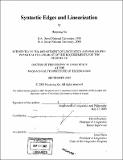Syntactic edges and linearization
Author(s)
Ko, Heejeong
DownloadFull printable version (12.86Mb)
Other Contributors
Massachusetts Institute of Technology. Dept. of Linguistics and Philosophy.
Advisor
David Pesetsky.
Terms of use
Metadata
Show full item recordAbstract
In this thesis, I investigate the question of how the units of a linguistic expression are linearly ordered in syntax. In particular, I examine interactions between locality conditions on movement and the mapping between syntax and phonology. I show that Cyclic Linearization of syntactic structure and constraints on domain-internal movement of multiple specifiers predict unique ordering restrictions at the edges of syntactic domains. As a consequence of cyclic Spell-out and conditions on syntactic agreement, elements externally merged as a constituent at the edge of a Spell-out domain cannot be separated by a domain-internal element. This proposal provides a unified account of a variety of types of ordering restrictions in scrambling - in particular, floating quantifier and possessor constructions in Korean and Japanese. Evidence is drawn from interactions among various factors, which include: scrambling, the scope and syntactic position of adverbs, depictive and resultative predicates, possessor constructions, and varieties of floating quantifiers, among others. It is argued that the domain of cyclic Spell-out must include the edge as well as the complement of a Spell-out domain. (cont.) This challenges the view that edges are designated escape hatches in syntax. Other results include arguments that scrambling is feature-driven movement, support for the view that syntactic agreement is feature sharing, as well as a particular repertoire of phases (including VP and well as vP).
Description
Thesis (Ph. D.)--Massachusetts Institute of Technology, Dept. of Linguistics and Philosophy, 2005. Includes bibliographical references (p. 257-267).
Date issued
2005Department
Massachusetts Institute of Technology. Department of Linguistics and PhilosophyPublisher
Massachusetts Institute of Technology
Keywords
Linguistics and Philosophy.